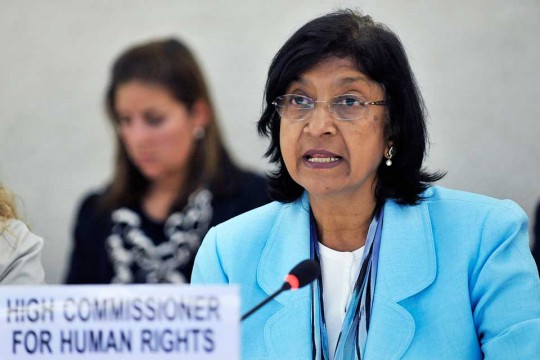No amnesty for gross human rights violations in Yemen, top UN official says
No amnesty for gross human rights violations in Yemen, top UN official says
 High Commissioner for Human Rights Navi Pillay
High Commissioner for Human Rights Navi Pillay
The United Nations human rights chief today warned that there must be no amnesty for gross rights violations in Yemen, stressing that the victims of the worst abuses during the country’s protracted crisis must have recourse to justice.
Navi Pillay, the UN High Commissioner for Human Rights, issued a statement calling on Yemeni decision-makers to respect the prohibition under international law against amnesties for the worst violations.
An amnesty law may soon be presented to Yemen’s Parliament in the wake of the resolution of the conflict that killed an unknown number of people as pro-and anti-Government forces clashed last year as part of the Arab Spring uprising that gripped the wider Middle East and North Africa.
Such an amnesty would be in violation of Yemen’s international human rights obligations.
Noting she has been closely following the debate about a possible amnesty in Yemen, Ms. Pillay said that both international law and UN policy are clear on the issue.
“Amnesties are not permissible if they prevent the prosecution of individuals who may be criminally responsible for international crimes, including war crimes, crimes against humanity, genocide and gross violations of human rights,” she said.
“Based on information we have gathered, there is reason to believe that some of these crimes were committed in Yemen during the period for which an amnesty is under consideration. Such an amnesty would be in violation of Yemen’s international human rights obligations.”
The High Commissioner underlined the importance of a victim-centred approach to justice in countries such as Yemen that are emerging from violent conflict or crisis.
“Victims have the right to justice, to the truth, to remedy and reparation – these are rights that are well-established internationally. Any adopted legislation would also need to respect the principle of equality before the law – meaning that there should be no discrimination between individuals who are pro-Government or in opposition and no distinction based on family connections. Every individual who commits a crime is accountable and should not be allowed to escape justice.”
###
About Office of the United Nations High Commissioner for Human Rights (OHCHR)
Who we are
The Office of the United Nations High Commissioner for Human Rights (OHCHR) represents the world’s commitment to universal ideals of human dignity. We have a unique mandate from the international community to promote and protect all human rights.
Leadership
The High Commissioner for Human Rights is the principal human rights official of the United Nations. The High Commissioner heads OHCHR and spearheads the United Nations’ human rights efforts. We offer leadership, work objectively, educate and take action to empower individuals and assist States in upholding human rights. We are a part of the United Nations Secretariat with our headquarters in Geneva.
The Office’s priorities are set out in two key strategic documents: the OHCHR Plan of Action and its Strategic Management Plan 2010-2011. These priorities include greater country engagement, working closely with our partners at the country and local levels, in order to ensure that international human rights standards are implemented on the ground; a stronger leadership role for the High Commissioner; and closer partnerships with civil society and United Nations agencies.
United Nations human rights system
We also support the work of the United Nations human rights mechanisms, such as the Human Rights Council and the core treaty bodies set up for monitoring State Parties’ compliance with international human rights treaties, promote the right to development, coordinate United Nations human rights education and public information activities, and strengthens human rights across the United Nations system. We work to ensure the enforcement of universally recognized human rights norms, including through promoting both the universal ratification and implementation of the major human rights treaties and respect for the rule of law.
Our structure
We have an office at United Nations headquarters in New York and offices in numerous countries and regions. In addition to the Executive Office of the High Commissioner and a number of units that report to the Deputy High Commissioner, OHCHR has two major divisions and four branches.
To implement our comprehensive mandate, we employ more than 850 staff (last update in April 2007), based in Geneva and New York and in 11 country offices and seven regional offices around the world, including a workforce of some 240 international human rights officers serving in UN peace missions. We are funded from the United Nations regular budget and from voluntary contributions from Member States, intergovernmental organizations, foundations and individuals.

###
> United Nations (UN).
 The United Nations was established on 24 October 1945 by 51 countries committed to preserving peace through international cooperation and collective security. Today, nearly every nation in the world belongs to the UN: membership totals 192 countries.
The United Nations was established on 24 October 1945 by 51 countries committed to preserving peace through international cooperation and collective security. Today, nearly every nation in the world belongs to the UN: membership totals 192 countries.
When States become Members of the United Nations, they agree to accept the obligations of the UN Charter, an international treaty that sets out basic principles of international relations. According to the Charter, the UN has four purposes:
- to maintain international peace and security;
- to develop friendly relations among nations;
- to cooperate in solving international problems and in promoting respect for human rights;
- and to be a centre for harmonizing the actions of nations.
###
* The above story is adapted from materials provided by United Nations (UN)
** More information at United Nations (UN)



















